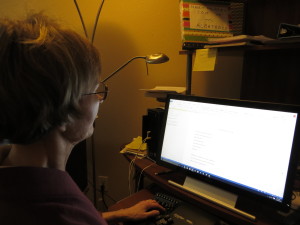Until very recently I believed that everybody did this. I believed that, when one was alone, whether sweeping the floor or driving, or simply distracted from whatever one was expected to be doing, one held interminable conversations with people who were not actually present. My dialogues were with historical figures, or, more commonly, writers whose voices had influenced me. Even people who were more completely imaginary: characters from a book, or a film, or even a television series, might be sitting invisibly by me and hearing what I said and responding to it.
When I conversed this way at home, usually in morning hours, the dogs were my audience, although not my intended audience. I didn’t expect them to respond, and they did not. They merely endured the low-level sound coming from my mouth as something characteristic of the human animal, or at least this human animal. The existence of the dogs was a comfort to me, as talking to one’s dogs is a step away from talking to one’s self.
When driving, I had no such excuse, but I never felt the need of one. Until it became likely that I might be seen by cameras at stoplights busily conversing to thin air, I felt free from the reasonable accusation that my brain was dissolving. Now I am more careful, in automobiles, to mutter, or simply think aloud.
G.K. Chesterton – author of the Father Brown series, and many, many other works.
The man who appears to me most often – always in my parlour, and in Ron’s leather recliner, because we have no other piece of furniture that could have contained his remarkable bulk, and I suppose my unconscious mind is realistic enough not to put him anywhere else – is Chesterton. I’ve always said, that with T.H. White, his writing has created the style locked into my head, so sometimes more of him than the style appears.
The first thing that happens, when Chesterton appears, which is usually when I’m just awake and am making my coffee, is that I must confront him with his virulent Anti-Semitism. Get it out of the way. I have read an over 700 page biography of the man, and it was largely an apologia, but still his frequent eruptions with the words ‘Jew’, and worse ‘Jewess’, as though Jewish people were animals like foxes or geese that have separate words for the male and the female, more than offend me. They stun me. I find myself railing at the huge figure in the recliner, (although not too loudly, lest I scare the dogs,) “Are you aware that brilliant, sensitive writers such as Neil Gaiman have also said that they were heavily influenced by your works in childhood? What must he have thought when he encountered your blaming the First World War, and all the failures of English society laid at the feet of his birth-people? And he so young!”
(I do realize that my prose, here, is becoming unmistakably Chestertonian in feel. But remember I began by stating his influence over me.)
I always see him hanging his head, or as close to hanging it as a man of his bulk might do. Tilting it down, at least.
Having gotten that out of the way, I thank him profusely for introducing me to the idea that the writer stands always as an intermediate between the story and the reader, and that the voice of the writer, and personal digressions by the writer from the story matter, are as entertaining to me as they were to him. And the use of paradox, and unexpected religious insights scattered into the narrative, are meaningful, even though my own spiritual beliefs are nothing like his. Although oddly much like those of Father Brown. And his conviction that anything approaching the fantastic is best done by showing the familiar in a new light, instead of constructing a heavy-handed allegorical world, has been of great value to me. I end my talk by saying that although my contemporary field finds his style (and so, mine) slow-moving and sometimes outright inexplicable, I don’t mind at all. I am happier writing like him than I would be writing like Tom Clancy, or any other of the moderns to go from catastrophe to castastrophe without letting a reader (or a writer) catch their breath.
Now, were G.K. Chesterton actually sitting in my parlour, I very much doubt the conversation would have gone in such a manner. I wouldn’t have been able to get a word in. Not even edgewise.
The reason I was convinced my imaginary conversations were universal to the human condition was simply my embarrassment knowing that, since I had constructed my verbal respondents, when we had a difference of opinion – a necessarily frequent happening – I always won the debate. This, in itself, was so much a stacking of the deck, or loading of the dice of the disagreement, I would hate for anyone to know I was doing it. It was so much like playing chess with one’s self and cheating. And I assumed everyone else on the planet felt as I did about it, and so, from an attempt not to appear the scoundrel I was, I kept my mouth shut (for once) about the existence of this wild and crazy inner life. I was certain any other person would do the same. So I have continued, for approximately sixty years, to live this way, mumbling to myself or to the non-human creatures about me, or even the furniture. And thinking every other soul did also.
It was only perhaps a week ago I asked Ron whether he did not spend his hours as I did. I expected him to answer “Of course,” or simply smile knowingly and shrug. Instead he looked at me intently and said “No. Not so often.”
This was quite a surprise. It was, in fact, a re-set of my expectations. The human condition was not entirely as I had thought it was. Not for all these years.
So I must re-evaluate my life of inner debate. I have not just been rigging the game of internal conversation. It seems I invented the game before I rigged it. My ego-centricity is far more overwhelming than I thought. I am not proud of myself.
Nonetheless, there have been some interesting conversations over the years. If I must take the blame for doing the thing, I can at least describe how I have done it.
The most common repeated dialogue I have is with any film or television actor who pronounces words in a way I disagree with. Of course I am arguing with the character, not the real actor, but as no one is there, it doesn’t matter.
I’m not a grammatical purist – in fact I am so bad and spelling it would be absurd for me to consider myself such. But I know a few things about the history of pronouncing the English language and so I have the tendency be a curmudgeon about them. The first of these is the pronunciation of the word e-i-t-h-e-r. I was taught once in school that the word in English had originally been pronounced eether, as Americans do, or did when I was a child. That the importation into England of the Georges from Germany, to serve as their monarchs, resulted in one king who never bothered to learn the language of the country, and a second who learned, but couldn’t be bothered to do it right. Therefore he still pronounced eether in the German manner, as eye-ther. The court around him wasn’t about to tell the king he was not speaking correctly, so they adopted his manner of speech and it became fashionable. More than fashionable. Anyone who wanted to think himself up-to-date and patriotic changed his pronounciation. (A similar thing occurred in Spain, when a monarch named Phillip had a lisp. Ever since there has been the very correct and high-brow ‘Castilian speech’, in which all educated people lisp. South America was colonized before this, and consequently my Mexican neighbors don’t do this, and as I was educated in Spanish by one who spoke the old-country tongue, (a Mr. O’Brien,) I was quite the spectacle to the people of the Southwest. They thought me cute.)
To return to either: The U.S. was settled by English-speaking people before the incident of the king named George, and so we have retained the old pronunciation, and have been ridiculed by the Brits for hundreds of years because of this. Therefore I often go muttering to British speaking actors – whomever I last saw on television – that I am right and they are wrong. Unfortunately, the pronunciation ‘eye-ther’ seems to be catching on by Americans also, as though they have suddenly realized they have been wrong all these years. Those people – mostly newscasters – I treat more harshly than the invisible Brits I feel beside me. Because the Americans have no excuse.
I used the ‘often’ a few paragraphs ago. That is another curmugeonly point with me. The ‘t’ in the word has been silent in English since the end of the fourteenth century, and yet American’s on the screen have suddenly – in the past fifteen years or so – seemed to believe they’ve had it wrong all this time and started pronouncing the ‘t’. Dammit, Shakespeare said ‘offen’, not ‘of-t-en’.
This is not my most interesting nor witty bit of conversation with a person who is not there, but, unfortunately, it is the most common.

